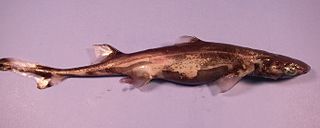
Etmopterus is a genus of lantern sharks in the squaliform family Etmopteridae. They are found in deep sea ecosystems of the Atlantic, Indian and Pacific Oceans.

Bathyraja is a large genus of skates in the family Arhynchobatidae.

Dipturus is a large genus of skates native to the Pacific, Atlantic, and Indian Oceans. They were formerly included in Raja. Some species initially moved to Dipturus were later placed in Dentiraja, Spiniraja, and Zearaja.

Notoraja is a genus of skates in the family Arhynchobatidae. They are found in deep water in the Indian and western Pacific Ocean.
Gurgesiella is a genus of fish in the family Gurgesiellidae. These relatively small deep-water skates are found in the Atlantic and Pacific Oceans off South and Central America.

Leucoraja is a genus of hardnose skates in the family Rajidae, commonly known as the rough skates. They occur mostly on continental shelves and slopes in the north-western and eastern Atlantic Ocean, the Mediterranean Sea, the south-western Indian Ocean, and Australia.

Rostroraja is a genus of skate belonging to the family Rajidae, native to the Atlantic Ocean and East Pacific, including the Mediterranean, Caribbean, Gulf of Mexico and Gulf of California. The genus was considered monotypic in the past, but a number of species usually classified in Raja have been reassigned to this genus based on genetic analysis.

The Chimaeridae, or short-nosed chimaeras, are a family of cartilaginous fish.

The Rhinochimaeridae, commonly known as long-nosed chimaeras, are a family of cartilaginous fish. They are similar in form and habits to other chimaeras, but have an exceptionally long conical or paddle-shaped snout. The snout has numerous sensory nerve endings, and is used to find food such as small fish. The first dorsal fin includes a mildly venomous spine, used in defense.

Arhynchobatidae is a family of skates and is commonly known as the softnose skates. It belongs to the order Rajiformes in the superorder Batoidea of rays. At least 104 species have been described, in 13 genera. Softnose skates have at times been placed in the same family as hardnose skates, but most recent authors recognize them as a distinct family. Members of the Arhynchobatidae can be distinguished from hardnose skates in having a soft and flexible snout, as well as a more or less reduced rostrum.

Breviraja, commonly known as lightnose skates, is a genus of small skates in the family Rajidae. They are found in deep water of the western Atlantic, including the Gulf of Mexico.
Cruriraja is a genus of skates in the family Gurgesiellidae. They are primarily found in the warm West Atlantic and off southern Africa, but C. andamanica is from the Indian Ocean.
Dipturus teevani, commonly known as the prickly brown ray or Caribbean skate, is a species of cartilaginous fish in the family Rajidae. The prickly brown ray is medium in size compared to other skates, and is known from a patchy, deep-water distribution in the western Atlantic Ocean.

Fenestraja plutonia is a species of cartilaginous fish in the family Gurgesiellidae. It is commonly known as the underworld windowskate or Pluto pygmy skate. The underworld windowskate is known from patches of continental slope in the western Atlantic Ocean between the coasts of the southern United States and Suriname.

Pygmy skates are cartilaginous fish belonging to the family Gurgesiellidae in the superorder Batoidea of rays. Nineteen species in three genera are known.

The Melbourne skate is a species of fish in the belonging to the skate family Rajidae. It is endemic to southern Australia. Its natural habitat is open seas. It is found at depths up to 345 meters.
The panrays are a genus, Zanobatus, of rays found in coastal parts of the warm East Atlantic Ocean, ranging from Morocco to Angola. It is the only genus in the family Zanobatidae, which traditionally has been included in the Myliobatiformes order, but based on genetic evidence it is now in Rhinopristiformes or a sister taxon to Rhinopristiformes.
Gurgesiella atlantica, commonly known as the Atlantic pygmy skate, Atlantic finless skate, or simply the Atlantic skate, is a skate species in the family Gurgesiellidae. It lives in the western central and southwest Atlantic Ocean, from Nicaragua to Brazil. It grows to 49 centimetres (19 in) – 52 centimetres (20 in) long and is distinguished from other skates by its long, slender tail and absence of dorsal fins.











